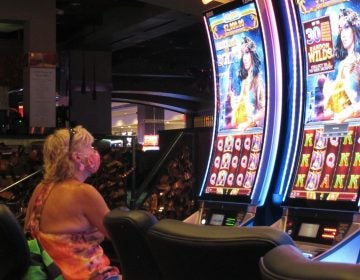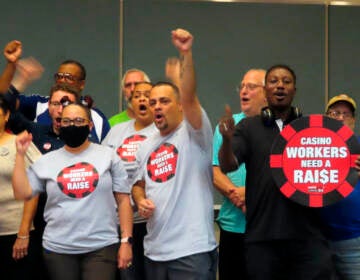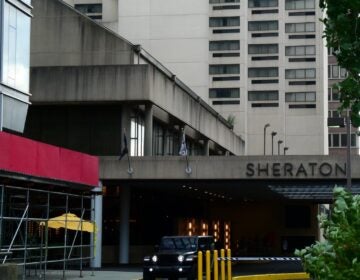Atlantic City casino workers push for a contract with strike wild card in hand
Negotiations will continue this week between Atlantic City casinos and the union, whose workers have authorized a strike on Fourth of July weekend.
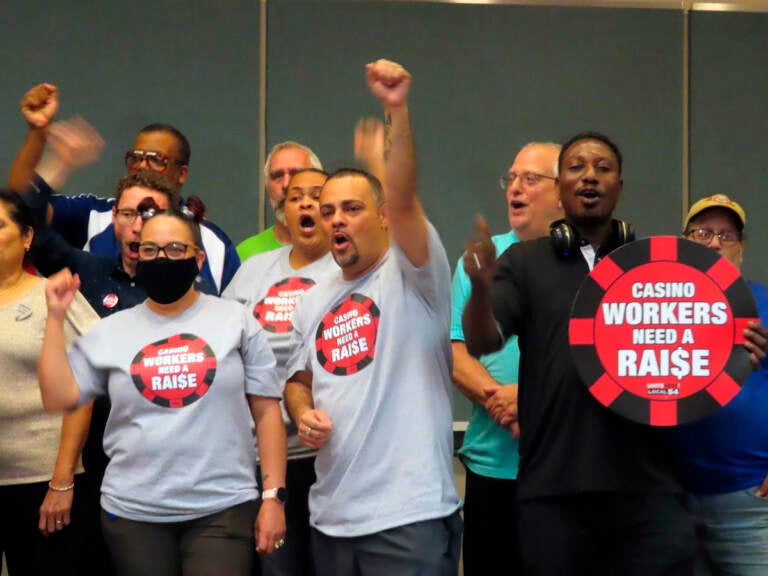
Members of Local 54 of the Unite Here union celebrate after voting on Wednesday, June 15, 2022, in Atlantic City, N.J., to authorize a strike against the casinos next month if a new contract is not reached in two weeks.(AP Photo/Wayne Parry)
Members of Unite Here Local 54 will try one last ditch effort this week to come to an agreement with five Atlantic City casinos to avert a strike that could happen as soon as the Fourth of July weekend.
A strike was authorized last Thursday, with plans to use it as a wild card against management at the Borgata and Hard Rock casinos, as well as Caesars Entertainment’s three properties — Caesars, Tropicana, Harrah’s.
Workers want to protect their health care, pension, and severance benefits. More than anything, they want more money — a livable wage.
“Gas is up. Groceries are up. Everything, you name it,” said Rodney Mills, a houseman at the Tropicana and a union shop steward. “It costs you way more than it used to, and the wages that we are currently making is not sustainable.”
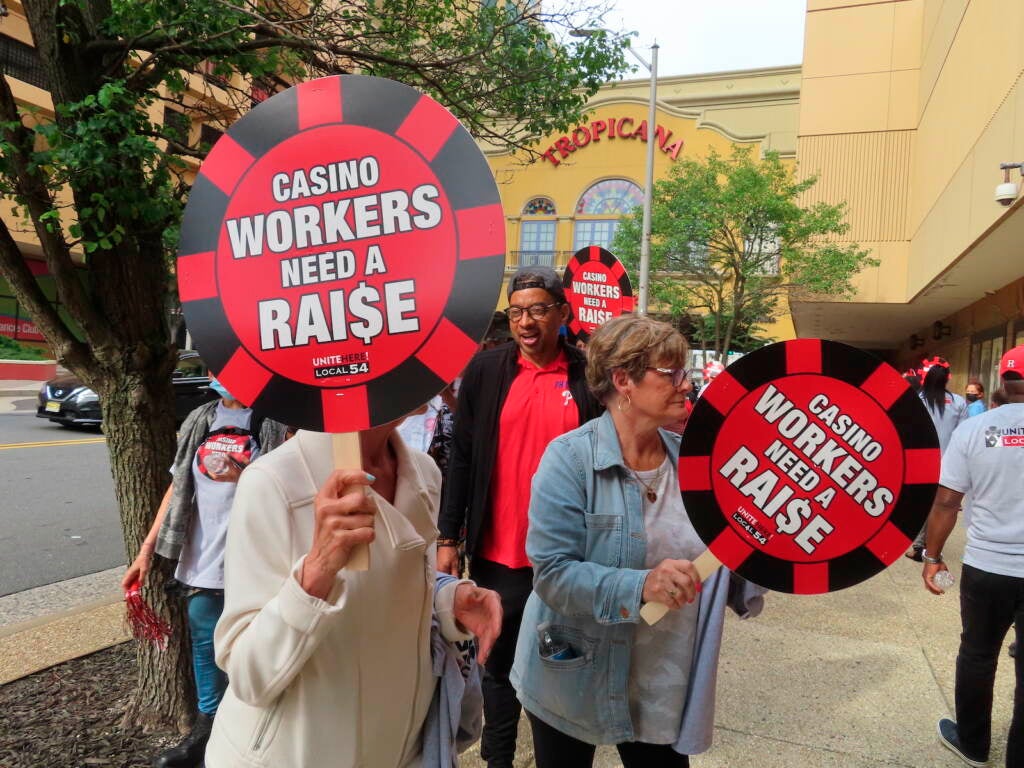
Mills said he makes $16.25 an hour, even though he has worked for Tropicana for 30 years, adding that he’s “pretty much homeless.” He’s also a single father of three children who recently applied for public assistance.
“There’s a lot of us that’s in this situation; I’m not the only one,” he said.
He adds management has only agreed to “some minor detail things” and that the union has not received a proposal since May 25. He calls the strike authorization “the weapon of mass destruction.”
Contracts with the casinos expired May 31.
Bally’s and the Ocean Casino Resort have reached “me-too” agreements with the union, where they go along with the terms of contracts reached with five casinos.
Two other properties — Golden Nugget and Resorts — are not affected by the strike authorization. However, according to Atlantic City Travel Alert, a website operated by the union, the two casinos are “at risk of dispute.”
Inconvenient timing
The labor dispute comes as Atlantic City casinos are continuing to recover from the COVID-19 pandemic. According to the New Jersey Division of Gaming Enforcement, casinos won $233 million in May, a 9.3% increase over the same month in 2021.
The proposed strike date also falls on one of the busiest weekends of the year in Atlantic City.
“The union picked that date to ratify their contract for that very reason,” said Jane Bokunewicz, director of Stockton University’s Lloyd D. Levenson Institute of Gaming, Hospitality and Tourism. “It gives them leverage that it’s right before the holiday weekend.”
She adds that it will be hard to predict how much of an impact a strike will have on the properties.
“You don’t know how many people will stay away, how well the management will be able to run the properties and keep them operating,” Bokunewicz said. “It’s hard to put a number [or] a percentage on it, but it will definitely have an impact for sure.”
A strike would also affect workers, she added, because the holiday weekend is a big time to earn tips.
“A lot of employees make most of their money — hospitality employees, especially — during the busy summer season because the tips are higher,” Bokunewicz said. “There’s more people and they can really make a lot of money on a Fourth of July weekend.”
The last major strike to hit the Jersey Shore resort city happened Oct. 1, 2004, when nearly 10,000 hotel and restaurant workers walked off the job and onto the picket line for more than a month.
Bokunewicz said none of the casinos involved at the time were closed.
“They had management employees, nonunion employees, and union employees that cross the picket line that continued to run the properties,” she noted. “They did restrict some of their operations, so they might have opened only two key restaurants instead of their full complement of restaurants.”
Eighteen years later, casinos are having a hard time filling available jobs. Before the pandemic, about 26,000 people were working in the casino industry. That number is now down to about 22,000.
A citywide job fair was held recently at the Atlantic City Convention Center by the Casino Association of New Jersey and the state gaming division. According to PlayNJ, a website that covers casinos in the state, more than 1,000 job seekers were at the event.
Mills said his employer, the Tropicana, held a few job fairs as well.
“I can’t say many people got hired,” he said, adding that anyone can go to another casino and make more than he does.
Bokunewicz adds that there are also fewer managers working at the casino now, compared to 2004.
“Over the years, they tried to save money and they eliminated certain positions to increase their profit margins,” she said.
The most recent strike in July 2016 only affected the Trump Taj Mahal casino, when 1,000 workers picketed for higher pay and the restoration of health and pension benefits cut after billionaire investor Carl Icahn bought the property out of bankruptcy. It would close three months later, reopening as the Hard Rock in 2018.
The contract under negotiation is very important for setting the tone over the next three years, according to Bokunewicz, noting that labor costs are the biggest expense in running a casino.
“They have to be mindful of keeping in mind profitability, but yet they have to pay the workers enough to be fair and to attract quality workers for the many customer service jobs that they depend on,” she said.

Get daily updates from WHYY News!
WHYY is your source for fact-based, in-depth journalism and information. As a nonprofit organization, we rely on financial support from readers like you. Please give today.



